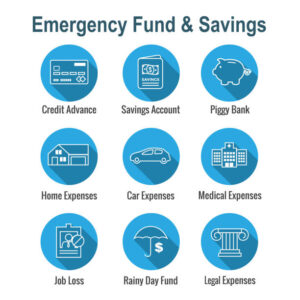Financial Planning Tips for New Parents: 8 Ways to Secure Your Family’s Future
As new parents, welcoming a new baby is an exciting life-changing event. Along with the joy and love, it brings new responsibilities—especially financial ones. The cost of raising a child can be surprisingly high. According to the U.S. Department of Agriculture, the average cost of raising a child from birth to age 18 is over $310,000. This includes everything from food and clothing to education and healthcare. With such significant expenses ahead, it’s essential for new parents to plan carefully to protect their family’s financial future.
But how do you start? What steps should you take to ensure your family’s money is managed wisely? This guide outlines eight practical and effective ways to build a strong financial foundation for your growing family. Each section offers clear advice backed by expert insights and research, helping you make informed decisions without feeling overwhelmed.
Are you ready to take control of your family’s finances and secure a stable future? Let’s dive in.
—
1. Build a Strong Emergency Fund: Your Financial Safety Net
(Image credit: isource images)

Life is unpredictable, and having a baby only increases the need for financial security. An emergency fund is money set aside to cover unexpected expenses, such as medical emergencies, job loss, or urgent home repairs. Without this safety net, families may have to rely on credit cards or loans, which can lead to debt and stress.
Financial expert Suze Orman recommends that as a family, you should save at least three to six months’ worth of living expenses. This amount provides a buffer that can cover rent or mortgage, utilities, groceries, childcare, and other essential costs. For new parents, it’s important to include baby-related expenses like diapers, formula, and medical visits in this calculation.
Starting an emergency fund can look stressful, especially with new expenses piling up. The key is to begin with small, regular contributions. Even setting aside $50 or $100 a month can add up over time. Keep this money in a separate savings account that is easy to access but not so easy that you’re tempted to spend it.
According to a 2023 survey by Bankrate, nearly 40% of Americans would struggle to cover a $1,000 emergency expense. This statistic highlights why an emergency fund is crucial, especially for families with new dependents.
How can you build your emergency fund:
- Calculate your monthly essential expenses, including baby costs. Set a realistic savings goal based on three to six months of expenses.
- Automate transfers to a dedicated savings account.
- Avoid tapping into this fund for non-emergencies.
Having this financial cushion reduces anxiety and allows you to focus on your family during difficult times.
—
2. Get the Right Insurance Coverage: You Should Protect What Matters Most
Insurance is a key part of financial planning for new parents. It protects your family from financial hardship if unexpected events occur. There are three main types of insurance to consider: health, life, and disability insurance.
Health Insurance
Health insurance is essential for both parents and your baby. Babies require frequent doctor visits, vaccinations, and sometimes emergency care. Without insurance, these costs can be overwhelming. The Centers for Medicare & Medicaid Services reports that in 2024, the average out-of-pocket cost per doctor visit was $30, but emergency visits and specialized care can cost hundreds or thousands of dollars.
Review your current health insurance plan to ensure your baby is covered from birth. If you don’t have insurance through an employer, explore options through the Health Insurance Marketplace or government programs like Medicaid or CHIP (Children’s Health Insurance Program).
Life Insurance
Life insurance provides financial support to your family if a parent passes away. It replaces lost income and helps cover ongoing expenses, including childcare and education costs. The Insurance Information Institute states that only about 60% of Americans have life insurance, and many do not have enough coverage.
Term life insurance is often recommended for new parents because it is affordable and provides coverage for a specific period, such as 20 or 30 years. This period typically covers the years when your child is dependent on you.
Disability Insurance
Disability insurance protects your income if you become ill or injured and cannot work. Since many families rely on one or two incomes, losing a paycheck can be devastating. According to the Social Security Administration, about one in four 20-year-olds will become disabled before reaching retirement age.
Check if your employer offers disability insurance as part of your benefits. If not, consider purchasing a private policy. Short-term disability covers temporary illnesses or injuries, while long-term disability covers extended periods.
Tips for choosing insurance:
- Ensure your health plan covers your baby’s needs.
- Calculate how much life insurance you need based on income, debts, and future expenses.
- Don’t overlook disability insurance; it’s a critical safety net.
- Review policies annually and update coverage as your family grows.
Insurance is peace of mind. It ensures that your family can maintain their lifestyle and meet financial obligations, even in tough times.
—
3. Adjust Your Budget for Baby Expenses: Know Where Your Money Goes

A new baby brings many new expenses. From diapers and formula to childcare and medical bills, your monthly costs will increase. The U.S. Bureau of Labor Statistics reports that families with children spend about 25% more on average than those without children. Creating or adjusting your budget to reflect these changes is essential.
Start by listing all your current expenses and then add estimated baby-related costs. Some common baby expenses include:
– Diapers and wipes
– Formula or breastfeeding supplies
– Baby clothes and gear
– Medical visits and prescriptions
– Childcare or babysitting fees
– Increased utility bills (heating, laundry)
Childcare often represents the largest expense. According to Child Care Aware of America, the average annual cost of center-based childcare in the U.S. is around $11,000, but it can be much higher depending on your location.
Tracking your spending helps you identify where you can cut back. For example, you might reduce dining out or subscription services to offset baby costs. Budgeting tools and apps like Mint or YNAB (You Need A Budget) can simplify this process and help you stay on track.
How to Create a Family Budget: 9 Essential Tips
Budgeting tips for new parents:

- Include all baby-related expenses in your budget.
- Track your spending for a few months to understand actual costs.
- Adjust discretionary spending to accommodate new needs.
- Plan for irregular expenses like vaccinations or holiday gifts.
A well-planned budget reduces financial stress and helps you prioritize spending on what matters most.
—
4. Use Tax Benefits to Your Advantage: Keep More of What You Earn
Having a child can qualify you for several tax benefits that reduce your tax bill and increase your refund. Understanding and using these benefits can free up money for savings or paying down debt.
Child Tax Credit
The Child Tax Credit (CTC) is one of the most valuable tax benefits for parents. For tax year 2024, eligible parents can claim up to $2,000 per qualifying child under age 17. This credit directly reduces the amount of tax you owe.
Dependent Care Credit
If you pay for childcare so you can work or look for work, you may qualify for the Dependent Care Credit. This credit can cover up to 35% of qualifying childcare expenses, up to a maximum of $3,000 for one child or $6,000 for two or more children.
Earned Income Tax Credit (EITC)
Low- to moderate-income families may qualify for the Earned Income Tax Credit, which can provide a significant refund. The amount depends on your income and number of children.
Other Tax Considerations
– Updating your W-4 form with your employer ensures the right amount of tax is withheld.
– Claiming your child as a dependent can increase your standard deduction.
– Keep good records of childcare expenses and medical costs to claim deductions or credits.
Tax laws change frequently, so consulting a tax professional can help you maximize these benefits and avoid mistakes.
—
5. Start Saving for Your Child’s Education Early: The Power of Time

College costs continue to rise every year. The College Board reports that average tuition and fees for in-state public colleges increased by nearly 3% annually over the past decade. Private colleges are even more expensive. Starting to save early gives your money time to grow and helps avoid large debt burdens later.
529 College Savings Plans
529 plans are popular because they offer tax advantages. Contributions grow tax-free, and withdrawals for qualified education expenses are also tax-free. Many states offer additional tax benefits for residents who contribute.
Coverdell Education Savings Accounts
Coverdell ESAs also provide tax-free growth but have lower contribution limits and income restrictions.
Custodial Accounts
Custodial accounts allow you to save money for your child, but they don’t offer tax benefits and the child gains control at age 18 or 21.
Even small, regular contributions can add up over 18 years. For example, saving $100 a month at a 6% annual return can grow to over $30,000 by the time your child turns 18.
Saving tips:
- Open a 529 plan as soon as possible.
- Automate monthly contributions.
- Encourage family members to contribute for birthdays or holidays.
- Review your savings plan annually to adjust contributions.
Starting early reduces the pressure of saving large amounts later and helps your child have more options for higher education.
—
6. Create or Update Your Will and Estate Plan: Protect Your Child’s Future

Estate planning is a highly necessary but often overlooked part of financial planning for new parents. A will is a legal document that specifies who will care for your child and how your assets will be distributed if you pass away.
Without a will, courts decide guardianship, which may not align with your wishes. This can cause delays and added stress for your family.
A Will? 10 Questions to Ask Yourself Before Writing a Will
Guardianship
Naming a guardian in your will ensures your child will be cared for by someone you trust. This decision should be discussed with the chosen guardian beforehand.
Trusts

A trust can protect your child’s inheritance until they reach an age you specify. This prevents the money from being misused and can provide for your child’s needs over time. 10 Estate Planning Strategies to Protect Your Family
Power of Attorney and Healthcare Directives
These documents allow someone to make financial or medical decisions on your behalf if you are unable to do so.
Reviewing Your Estate Plan
Life changes such as divorce, remarriage, or the birth of another child require updates to your estate plan.
Legal experts advise that every parent should have these documents in place to avoid complications and protect their family.
—
7. Prioritize Retirement Savings: Your Family’s Long-Term Security

While it’s tempting to focus all your resources on your child, neglecting retirement savings can create problems later. The Employee Benefit Research Institute reports that many Americans are not saving enough for retirement, which can lead to financial dependence on their children.
Balancing retirement and college savings is challenging but necessary. Your retirement savings ensure you won’t have to rely on your child financially when you grow older.
10 Lifesaving Tips to Ensure You Have Enough for Retirement
Employer-Sponsored Plans
If your employer offers a 401(k) or similar plan, contribute enough to get the full company match. This is essentially free money.

Individual Retirement Accounts (IRAs)
IRAs provide tax advantages and flexibility. Roth IRAs allow tax-free withdrawals in retirement, while traditional IRAs offer tax deductions now.
Saving Tips
- Aim to save 10-15% of your income for retirement.
- Increase contributions gradually as your income grows.
- Review your investment choices and risk tolerance regularly.
Retirement planning is a long-term commitment that benefits your entire family.
—
8. Work with Financial and Tax Professionals: Get Expert Guidance

Financial planning can be complicated, especially with a new baby and changing priorities. Working with professionals can help you create a plan tailored to your needs.
Financial Advisors
Certified financial planners can help with budgeting, saving, investing, insurance, and estate planning. They provide objective advice and help you stay on track.
Tax Professionals
Tax advisors help you navigate credits, deductions, and filing requirements. They ensure you maximize benefits and avoid costly errors.
When to Seek Help
– When your financial situation becomes complex.
– If you want to optimize savings and investments.
– To get help with estate and tax planning.
Professional advice can save you money and reduce stress, allowing you to focus on your family.
FAQs
How much should I save in an emergency fund as a new parent?
Aim for three to six months of living expenses, including baby-related costs.
What insurance is essential for new parents?
Health insurance for your baby, life insurance to protect income, and disability insurance to cover lost wages.
When should I start saving for my child’s education?
As early as possible to take advantage of compound interest.
How can I maximize tax benefits for my family?
Claim the Child Tax Credit, Dependent Care Credit, and update your tax withholding.
Do I really need a will if I’m young and healthy?
Yes. A will ensures guardianship and asset distribution are clear.
—
Financial planning for new parents is about creating security and peace of mind. It involves understanding your new expenses, protecting your family with insurance, saving for the future, and making smart legal and tax decisions. Taking these steps now means you can focus on enjoying your child’s early years without constant financial worry.
Are you ready to start building a strong financial foundation for your family today? The sooner you begin, the better prepared you will be for whatever the future holds.
—
Sources & Further Reading
– [U.S. Department of Agriculture – Cost of Raising a child.http://(https://www.usda.gov/media/blog/2017/01/30/cost-raising-child)
– [Insurance Information Institute – Life Insurance Facts]http://(https://www.iii.org/article/life-insurance-facts)
– [College Board – Trends in College Pricing]http://(https://research.collegeboard.org/trends/college-pricing)
– [IRS – Child Tax Credit.(https://www.irs.gov/credits-deductions/child-tax-credit)
– [Employee Benefit Research Institute – Retirement Savings]http://(https://www.ebri.org/retirement/retirement-savings)
– [Child Care Aware of America – Childcarewwwrg/our-issues/research/)
—
This comprehensive guide is designed to help new parents navigate the financial challenges ahead with confidence and clarity. Taking control of your finances now lays the groundwork for a secure and happy family future.










jdfit2
njnaqo
jwy2zf
x2m1na
5oot65
kg9v4k
cbvn6h
52iafg